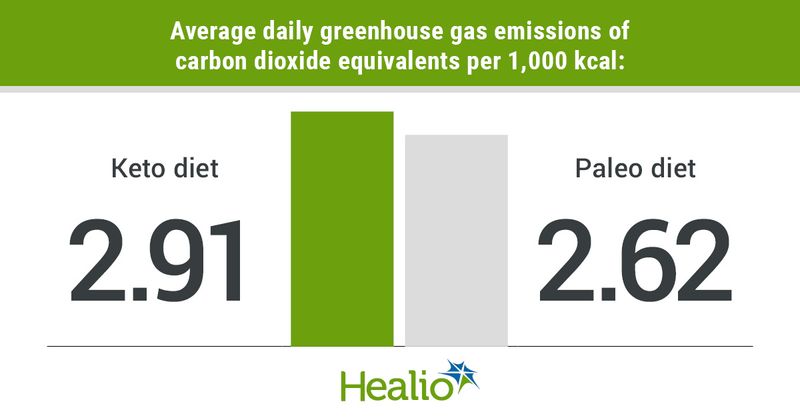March 02, 2023
2 min read
The keto and paleo diets had the lowest scores for overall nutritional quality among popular diets, while having the highest carbon emissions, a study in the American Journal of Clinical Nutrition found.
According to Keelia O’Malley, PhD, MD, a clinical assistant professor at Tulane University School of Public Health and Tropical Medicine, and colleagues, keto- and paleo-style diets have risen in popularity in recent years.

Data derived from: O’Malley K, et al. Am J Clin Nutr. 2023;doi:10.1016/j.ajcnut.2023.01.009.
“As more consumers make choices about pursuing particular diets, information on both the nutritional quality and carbon footprints of these diets as commonly selected becomes more important,” they wrote. “However, the [greenhouse gas emissions] of these popular diets, as selected and reported by U.S. adults, has not been well studied.”
O’Malley and colleagues analyzed 24-hour recall data from the 2005 to 2010 National Health and Nutrition Examination Survey to determine the health and environmental values of the keto and paleo diets, and how they compare with other diets. The researchers used the Healthy Eating Index (HEI) to ascertain nutritional quality.
A total of 16,412 participants were divided into six subgroups according to diet:
- vegetarian, defined as consuming less than 0.5 oz equivalent of meat, poultry and seafood (n = 1,179);
- pescatarian, defined as consuming less than 0.5 oz equivalent of meat and poultry (n = 778);
- vegan, defined as consuming less than 0.5 oz equivalent of meat, poultry, seafood and eggs and less than 0.25 cups equivalent of dairy (n = 141);
- keto, defined as consuming 50 g or less of net carbohydrates (n = 77);
- paleo, defined as consuming less than 0.5 oz equivalent of grains and legumes and less than 0.25 cups equivalent of dairy (n = 62); and
- omnivore, defined as anything outside the five other diets (n = 14,175).
Overall, the vegan diet had the lowest average carbon footprint, with a mean of 0.69 kg of carbon dioxide equivalent (CO2-eq) per 1,000 kcal, according to the researchers. The vegetarian (1.16 kg) and pescatarian (1.66 kg) diets were the second- and third-lowest carbon dioxide producers.
In contrast, the keto diet had the highest average carbon footprint, with a mean of 2.91 kg of CO2-eq per 1,000 kcal, followed by the paleo (2.62 kg) and omnivore (2.23 kg) diets.
The keto diet also ranked lowest in HEI quality, with a mean score of 43.69 out of a possible 100 points, followed by the paleo diet (45.03). The pescetarian diet had the highest diet quality score (58.76).
“Both keto and paleo diets have been associated with negative effects on blood lipids, specifically increased low-density lipoprotein cholesterol, raising concern about the long-term health outcomes associated with these diets,” O’Malley and colleagues wrote. “These diets tend to be higher in animal foods and lower in plant foods than other popular diets, which could, in part, explain the negative effects on blood lipids and our results on carbon footprints and diet quality.”
O’Malley and colleagues estimated that “for any given day, if a third of the omnivores consumed a 2,000 kcal vegetarian diet, and assuming accompanying shifts in domestic production, the savings would be equivalent to eliminating 340 million passenger vehicle miles.”
“Clearly, the work of assessing diets for healthiness and environmental impacts is nuanced, as our results point out,” they concluded. “This calls for additional research as well as public policy attention, given the urgency to address climate change.”
References:
Sources/Disclosures
Collapse
Disclosures:
O’Malley reports no relevant financial disclosures. Please see the study for all other authors’ relevant financial disclosures.
Source: healio.com























Add comment